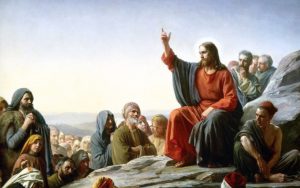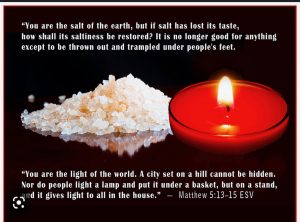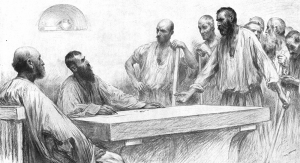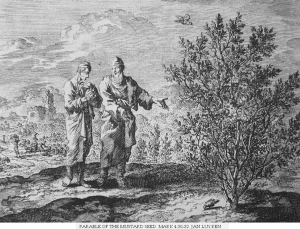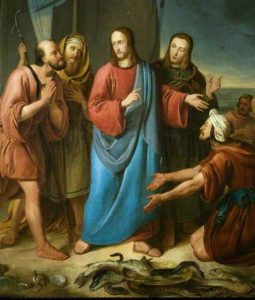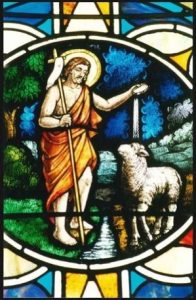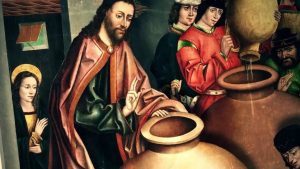When we buy new gadgets and appliances, we always look at the manual of instructions to proceed setting it up or learning how to make use of the new things correctly. I am sometimes frustrated when the font or the size of the letters are too small for me to read. However, I remember how my parents taught me to be patient in order to achieve good results. Learning perfection is not easy. How does one keep all the instructions in mind?
In the same manner, we have to realize that our way of living our Catholic Faith calls us to disclose the most beautiful instructions of the Lord through scriptures. To keep our life easy to follow the Lord, we need certain rules and instructions providing clear vision and understanding of what is expected of us. It is both simple and yet complicated, but what is affirming is Jesus’ invitation to a personal relationship with Him. How do we foster this “life-changing” relationship with Him? We are sent to be “Fishers of Men,” to go fishing for Christ so that we can gather “Intentional Disciples”. We must initiate all the movement of our actions towards others in order to bring them closer to Jesus. We also pray to sustain our faith and to nourish our lives through the Sacraments, especially the Eucharist.
The first reading from the Prophet Zephaniah is reminding us about important instructions, “Seek the Lord, all you humble of the earth, who have observed his law, seek justice, seek humility, perhaps you may be sheltered on the day of the Lord’s anger.” I believe that “pride” is the cause of the disintegrating sin for Israel.
The second reading taken from St. Paul’s 1st letter to the Corinthians tells us to be wise and learn from Jesus Christ, who became for us the wisdom from God. “Whoever boast, should boast in the Lord.”
The gospel today is taken from the evangelist Matthew 5:1-2, and it is known as the Sermon on the Mount: “Now when He saw the crowds, He went up on a mountainside and sat down. His disciples came to Him, and He began to teach them…” This is Christ’s beautiful sermon which really touched His listeners and myself personally. I would say it is the so called “Constitution of the Church” which contains several different topics. I would not attempt to comment on every section, but rather to give a brief summary of what it contains. If we would summarize this in a single sentence, it would be like this, “We are seekers of God, then how do we live a life that is dedicated to and pleasing to God, free from hypocrisy, full of love and grace, full of wisdom and discernment?”
When I share my personal reflection, I always come to think about St. Augustine’s brilliant idea in order for me to learn from him. I found these words from, our Father St. Augustine, profound reflection saying that “anyone who piously and earnestly ponders the Sermon on the Mount. I believe he will find therein … the perfect standard of the Christian Life.” For Augustine, it is very useful to understand that this is an important teaching of Jesus explaining to us the divine principles of justice guiding us to the narrow path that leads to communion with Him. Instead of taking this as a constant prophetic instruction, Jesus would plant a seed in His listeners, a life that rejoices propriety and perfection. We are simply being asked to seek God. Clearly this gospel gives a definition of how to seek the Lord. We seek the Lord by seeking justice and righteousness, by seeking peace, by seeking humility.
Beatitude is to perfect us through redemptive suffering. By acting towards goodness, humility, peace, and kindness toward each other, we will certainly know who we are. Keeping them in our hearts is difficult; however, St. Augustine explains that “the profitable thing is not suffering those evils but bearing them with equanimity and cheerfulness for the sake of Christ.”
I guess not everyone understands the complexity of this sermon. Let us remember that Jesus was born poor and went against the standard norms of the world. Jesus is a great teacher and the greatest leader; therefore, we must try to understand him and his message. We discover that these Beatitudes correspond to the “Gifts of the Holy Spirit.”
First, Poverty of spirit corresponds with fear of the Lord in which all wisdom begins.
Second, Meekness corresponds with piety, honor for the sacred Scriptures and the restrained power to live them out.
Third, Mourning corresponds with the gift of knowledge and facilitates the discernment of good from evil.
Fourth, Hunger and thirst for justice corresponds with the gift of fortitude to be truly just.
Fifth, Mercy coincides with the gift of counsel which exhorts us to forgive as we wish to be forgiven.
Sixth, Purity of heart corresponds with the gift of understanding what the eye has not seen and the ear has not heard.
Seven, Peacemaking corresponds with the gift of wisdom.
These seven articles of the Beatitudes are a free will choice to follow. However, there is an eighth one, that is for us not to fail to choose these first seven. In truth, St. Augustine is teaching us that “everything is in submission to man’s spirit because that spirit is obedient to God.”
Therefore, I don’t conform to some modern interpretation that Beatitudes are some type of social reform, trying to lift up the plight of the poor and those who were persecuted, but St. Augustine is inviting us to direct this Sermon of Jesus to our inward and interiority to form a basis or ground for our prayer life and honest conversation with God. It would be helpful to take each one of the seven and pray. Which ones are more attractive and graceful for us to make our own?
God bless you.
Fr. Arlon, osa
———————————
El dictado del corazón: Cuarto Domingo del Tiempo Ordinario, año A
- Sofonías 2:3; 3:12-13
- Salmos 146:6-7, 8-9, 9-10
- 1 Corintios 1:26-31
- Mateo 5:1-12a
Cuando compramos nuevos aparatos y electrodomésticos, vemos el manual de instrucciones para proceder a configurarlo o aprender a utilizar correctamente. Aveces me siento frustrado cuando la fuente o el tamaño de las letras son demasiado pequeños para leer. Sin embargo, recuerdo cómo mis padres me enseñaron a tener paciencia para lograr buenos resultados. Aunque no es fácil. ¿Cómo se tienen en cuenta todas las instrucciones?
De la misma manera, debemos darnos cuenta que nuestra forma de vivir nuestra Fe Católica nos llama a divulgar las más bellas instrucciones del Señor a través de las Escrituras. Para mantener nuestra vida fácil para seguir al Señor, necesitamos ciertas reglas e instrucciones que proporcionen una visión clara y una comprensión de lo que se espera de nosotros. Es a la vez simple y, sin embargo, complicado, pero lo que afirma es la invitación de Jesús a una relación personal con Él. ¿Cómo fomentamos esta relación con Él que “cambia la vida”? Somos enviados a ser “Pescadores de hombres”, a ir a pescar a Cristo para que podamos reunir “Discípulos intencionales”. Debemos iniciar todo el movimiento de nuestras acciones hacia los demás para acercarlos a Jesús. También rezamos para sostener nuestra fe y nutrir nuestra vida a través de los Sacramentos, especialmente la Eucaristía.
La primera lectura del profeta Sofonías nos recuerda importantes instrucciones: “Buscad al Señor, todos los humildes de la tierra, que has observado su ley, buscar la justicia, buscar la humildad, tal vez sean protegidos en el día de la ira del Señor. .” Yo creo que el “orgullo” es la causa del pecado que desintegra a Israel.
La segunda lectura tomada de la primera carta de San Pablo a los Corintios nos dice que seamos sabios y aprendamos de Jesucristo, quien se hizo para nosotros sabiduría de Dios. “El que se gloríe, que se gloríe en el Señor”.
El evangelio de hoy está tomado del evangelista Mateo 5:1-2, y es conocido como el Sermón de la Montaña: “Al ver la multitud, subió a la ladera de un monte y se sentó. Se le acercaron sus discípulos, y comenzó a enseñarles…” Este es el hermoso sermón de Cristo que realmente tocó a sus oyentes y a mí personalmente. Yo diría que es la llamada “Constitución de la Iglesia” que contiene varios temas diferentes. No intentaré comentar cada sección, sino dar un breve resumen de lo que contiene. Si tuviéramos que resumir esto en una sola oración, sería así: “Somos buscadores de Dios, entonces, ¿cómo vivimos una vida dedicada y agradable a Dios, libre de hipocresía, llena de amor y gracia, llena de sabiduría y discernimiento?”
Cuando comparto mi reflexión personal, siempre vengo a pensar en la brillante idea de San Agustín para poder aprender de él. Encontré estas palabras de, nuestro Padre San Agustín, de profunda reflexión diciendo que “cualquiera que medite piadosa y seriamente el Sermón de la Montaña. Creo que encontrará allí… la norma perfecta de la vida cristiana”. Para Agustín es muy útil entender que esta es una importante enseñanza de Jesús al explicarnos los principios divinos de la justicia guiándonos por el camino angosto que lleva a la comunión con Él. En lugar de tomar esto como una instrucción profética constante, Jesús plantaría una semilla en sus oyentes, una vida que regocija la propiedad y la perfección. Simplemente se nos pide que busquemos a Dios. Claramente este evangelio da una definición de cómo buscar al Señor. Buscamos al Señor buscando la justicia y la rectitud, buscando la paz, buscando la humildad. La bienaventuranza es perfeccionarnos a través del sufrimiento redentor. Actuando hacia el bien, la humildad, la paz y la amabilidad entre nosotros, ciertamente sabremos quiénes somos. Mantenerlos en nuestros corazones es difícil; sin embargo, San Agustín explica que “lo provechoso no es sufrir esos males, sino soportarlos con serenidad y alegría por Cristo”.
Supongo que no todos entienden la complejidad de este sermón. Recordemos que Jesús nació pobre y fue en contra de las normas estándares del mundo. Jesús es un gran maestro y el mayor líder; por lo tanto, debemos tratar de entenderlo a él y su mensaje. Descubrimos que estas Bienaventuranzas corresponden a los “Dones del Espíritu Santo”.
En primer lugar, la pobreza de espíritu se corresponde con el temor del Señor en el que comienza toda sabiduría.
En segundo lugar, la mansedumbre se corresponde con la piedad, el honor de las Sagradas Escrituras y el poder moderado de vivirlas.
Tercero, el duelo se corresponde con el don del conocimiento y facilita el discernimiento del bien y del mal.
En cuarto lugar, el hambre y la sed de justicia se corresponden con el don de la fortaleza para ser verdaderamente justos.
Quinto, la Misericordia coincide con el don de consejo que nos exhorta a perdonar como queremos ser perdonados.
Sexto, la pureza de corazón corresponde al don de entender lo que el ojo no vio y el oído no oyó.
Siete, la pacificación se corresponde con el don de la sabiduría.
Estos siete artículos de las Bienaventuranzas son una elección de libre albedrío a seguir. Sin embargo, hay una octava, que es para que no dejemos de elegir estas siete primeras. En verdad, San Agustín nos está enseñando que “todo está en sumisión al espíritu del hombre porque ese espíritu es obediente a Dios”.
Por lo tanto, no me conformo con alguna interpretación moderna de que las Bienaventuranzas son algún tipo de reforma social, tratando de mejorar la situación de los pobres y perseguidos, pero San Agustín nos está invitando a dirigir este Sermón de Jesús hacia nuestro interior y profundizar para formar una base o terreno para nuestra vida de oración y conversación honesta con Dios. Sería útil tomar cada uno de los siete puntos y orar. ¿Cuáles son los más atractivos para que los hagamos nuestros?
Dios te bendiga.
Padre Arlón, osa
